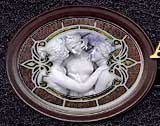Literary Commentary: John Donne's "The Apparition"
1 When by thy scorne, O murdresse, I am dead,
2 And that thou thinkst thee free
3 From all solicitation from mee,
4 Then shall my ghost come to thy bed,
5 And thee, fain'd vestall, in worse armes shall see;
6 Then thy sicke taper will begin to winke,
7 And he, whose thou art then, being tyr'd before,
8 Will, if thou stirre, or pinch to wake him, thinke
9 Thou call'st for more,
10 And in false sleepe will from thee shrinke,
11 And then poore Aspen wretch, neglected thou
12 Bath'd in a cold quicksilver sweat wilt lye
13 A veryer ghost than I;
14 What I will say, I will not tell thee now,
15 Lest that preserve thee; and since my love is spent,
16 I'had rather thou shouldst painfully repent,
17 Than by my threatenings rest still innocent.
John Donne must certainly have suffered the pangs of rejection; the delightfully bitter poem
"The Apparition" shows the depth of the emotional pit into which jilted lovers can descend,
consumed with spiteful venom and a desire to see their former paramour hurt as much as they. It
includes the aspect of consequence - the "you'll be sorry" threat that angry, wounded lovers
may take; a claim that her new lover will be unable to satisfy as he had; even an insinuation
that the woman's choice will cause death. In this case Donne makes it literal, claiming that his
revenant will visit her and make her as pale and shivery as he. Not for him to commit
self-absorbed suicide at her actions; her fickle rejection will do it for him. He also takes
joy in exacting revenge, waiting for the opportunity to make maximum negative impact as she
discovers she is as neglected as he, and that her new lover is exhausted from her advances.
I chose what seems to be an older version of this poem, with more archaic spelling, rather than
the modernized version contained within the Norton Anthology, as it more perfectly fits what is
probably Donne's intended meter (for instance, murdresse instead of murderess). Also, I discovered
several versions with the phrase "And thee, feigned vestal," where feigned is spelled
fain'd. This to me creates more interest, as it now takes on additional meaning: a play
on "feigned vestal" as in a pretense at chastity, and a "fain'd vestall" as in a willing or
obliged virgin. Donne might well have intended both meanings to hover in the air, suggesting that
a woman moving on to another relationship must appear without a past, untouched and virginal,
something which would cause even more ire from her forsaken lover, but some books have nailed it
down to the single meaning. He also says that she will in a sweat "lye," which, as lye is a
liquid leached from wood ashes, might be an extension of the conceit of her being as shaky as an
aspen, but I think I'm reaching on that.
Some sources suggest that words such as solicitation might be pronounced with six syllables, and
I tried to look for such things as I read through this piece.
Donne does take liberties with the rhythm in these 17 lines. Eleven lines are iambic pentameter,
and one ("lest that preserve thee; and since my love is spent,") is stretched to hexameter, or
somewhere in between; awkward to count out, but satisfying to read. Several lines are brief,
almost bouncy, consisting of two, three, or four iambic or trochaic feet. The rhyme scheme
(abbab-cdcdc-effe-ggg) is also unconventional, which increases my pleasure at this morose,
morbid expression of love lost.
David Elsensohn, May 2005
Return to Essays
|

